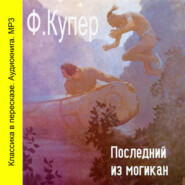По всем вопросам обращайтесь на: info@litportal.ru
(©) 2003-2024.
✖
Mercedes of Castile: or, The Voyage to Cathay
Настройки чтения
Размер шрифта
Высота строк
Поля
"Why not, daughter? We may have been too hasty in this matter, and mistaken what are truly signs of devotion to thee, for proofs of fickleness and inconstancy."
"Ah! Señora! but this can never be, else would not Ozema so love him."
"How know'st thou, child, that the princess hath any other feeling for the count than that which properly belongeth to one who is grateful for his care, and for the inexpressible service of being made acquainted with the virtues of the cross? Here is some rash error, Beatriz."
"I fear not, your Highness. Touching the nature of Ozema's feelings, there can be no misconception, since the innocent and unpractised creature hath not art sufficient to conceal them. That her heart is all Luis', we discovered in the first few hours of our intercourse; and it is too pure, unsought, to be won. The feeling of the Indian is not merely admiration, but it is such a passionate devotion, as partaketh of the warmth of that sun, which, we are told, glows with a heat so genial in her native clime."
"Could one see so much of Don Luis, Señora," added Mercedes, "under circumstances to try his martial virtues, and so long daily be in communion with his excellent heart, and not come to view him as far above all others?"
"Martial virtues – excellent heart!" – slowly repeated the queen, "and yet so regardless of the wrong he doeth! He is neither knight nor cavalier worthy of the sex, if what thou thinkest be true, child."
"Nay, Señora," earnestly resumed the girl, whose diffidence was yielding to the wish to vindicate our hero, "the princess hath told us of the manner in which he rescued her from her greatest enemy and persecutor, Caonabo, a headstrong and tyrannical sovereign of her island, and of his generous self-devotion in her behalf."
"Daughter, do thou withdraw, and, first calling on Holy Maria to intercede for thee, seek the calm of religious peace and submission, on thy pillow. Beatriz, I will question the princess alone."
The marchioness and Mercedes immediately withdrew, leaving Isabella with Ozema, in possession of the room. The interview that followed lasted more than an hour, that time being necessary to enable the queen to form an opinion of the stranger's explanations, with the imperfect means of communication she possessed. That Ozema's whole heart was Luis', Isabella could not doubt. Unaccustomed to conceal her preferences, the Indian girl was too unpractised to succeed in such a design, had she even felt the desire to attempt it; but, in addition to her native ingenuousness, Ozema believed that duty required her to have no concealments from the sovereign of Luis, and she laid bare her whole soul in the simplest and least disguised manner.
"Princess," said the queen, after the conversation had lasted some time, and Isabella believed herself to be in possession of the means of comprehending her companion, "I now understand your tale. Caonabo is the chief, or, if thou wilt, the king of a country adjoining thine own; he sought thee for a wife, but being already married to more than one princess, thou didst very properly reject his unholy proposals. He then attempted to seize thee by violence. The Conde de Llera was on a visit to thy brother at the time" —
"Luis – Luis" – the girl impatiently interrupted, in her sweet, soft voice – "Luis no Conde – Luis."
"True, princess, but the Conde de Llera and Luis de Bobadilla are one and the same person. Luis, then, if thou wilt, was present in thy palace, and he beat back the presumptuous cacique, who, not satisfied with fulfilling the law of God by the possession of one wife, impiously sought, in thy person, a second, or a third, and brought thee off in triumph. Thy brother, next, requested thee to take shelter, for a time, in Spain, and Don Luis, becoming thy guardian and protector, hath brought thee hither to the care of his aunt?"
Ozema bowed her head in acknowledgment of the truth of this statement, most of which she had no difficulty in understanding, the subject having, of late, occupied so much of her thoughts.
"And, now, princess," continued Isabella, "I must speak to thee with maternal frankness, for I deem all of thy birth my children while they dwell in my realms, and have a right to look to me for advice and protection. Hast thou any such love for Don Luis as would induce thee to forget thine own country, and to adopt his in its stead?"
"Ozema don't know what 'adopt his,' means," observed the puzzled girl.
"I wish to inquire if thou wouldst consent to become the wife of Don Luis de Bobadilla?"
"Wife" and "husband" were words of which the Indian girl had early learned the signification, and she smiled guilelessly, even while she blushed, and nodded her assent.
"I am, then, to understand that thou expectest to marry the count, for no modest young female like, thee, would so cheerfully avow her preference, without having that hope ripened in her heart, to something like a certainty."
"Si, Señora – Ozema, Luis' wife."
"Thou meanest, princess, that Ozema expecteth shortly to wed the count – shortly to become his wife!"
"No – no – no – Ozema now Luis' wife. Luis marry Ozema, already."
"Can this be so?" exclaimed the queen, looking steadily into the face of the beautiful Indian to ascertain if the whole were not an artful deception. But the open and innocent face betrayed no guilt, and Isabella felt compelled to believe what she had heard. In order, however, to make certain of the fact, she questioned and cross-questioned Ozema, for near half an hour longer, and always with the same result.
When the queen arose to withdraw, she kissed the princess, for so she deemed this wild creature of an unknown and novel state of society, and whispered a devout prayer for the enlightenment of her mind, and for her future peace. On reaching her own apartment, she found the Marchioness of Moya in attendance, that tried friend being unable to sleep until she had learned the impressions of her royal mistress.
"'Tis even worse than we had imagined, Beatriz," said Isabella, as the other closed the door behind her. "Thine heartless, inconstant nephew hath already wedded the Indian, and she is, at this moment, his lawful wife."
"Señora, there must be some mistake in this! The rash boy would hardly dare to practise this imposition on me, and that in the very presence of Mercedes."
"He would sooner place his wife in thy care, Daughter-Marchioness, than make the same disposition of one who had fewer claims on him. But there can be no mistake. I have questioned the princess closely, and no doubt remaineth in my mind, that the nuptials have been solemnized by religious rites. It is not easy to understand all she would wish to say, but that much she often and distinctly hath affirmed."
"Your Highness – can a Christian contract marriage with one that is yet unbaptized?"
"Certainly not, in the eye of the church, which is the eye of God. But I rather think Ozema hath received this holy rite, for she often pointed to the cross she weareth, when speaking of the union with thy nephew. Indeed, from her allusions, I understood her to say that she became a Christian, ere she became a wife."
"And that blessed cross, Señora, was a gift of Mercedes to the reckless, fickle-minded boy; a parting gift in which the holy symbol was intended to remind him of constancy and faith!"
"The world maketh so many inroads into the hearts of men, Beatriz, that they know not woman's reliance and woman's fidelity. But to thy knees, and bethink thee of asking for grace to sustain thy ward, in this cruel, but unavoidable extremity."
Isabella now turned to her friend, who advanced and raised the hand of her royal mistress to her lips. The queen, however, was not content with this salutation, warm as it was; passing an arm around the neck of Doña Beatriz, she drew her to her person, and imprinted a kiss on her forehead.
"Adieu, Beatriz – true friend as thou art!" she said. "If constancy hath deserted all others, it hath still an abode in thy faithful heart."
With these words the queen and the marchioness separated, each to find her pillow, if not her repose.
CHAPTER XXIX
"Now, Gondarino, what can you put on now
That may deceive us?
Have ye more strange illusions, yet more mists,
Through which the weak eye may be led to error?
What can ye say that may do satisfaction
Both for her wronged honor and your ill?"
Beaumont and Fletcher.
The day which succeeded the interview related in the preceding chapter, was that which Cardinal Mendoza had selected for the celebrated banquet given to Columbus. On this occasion, most of the high nobility of the court were assembled in honor of the admiral, who was received with a distinction which fell little short of that usually devoted to crowned heads. The Genoese bore himself modestly, though nobly, in all these ceremonies; and, for the hour, all appeared to delight in doing justice to his great exploits, and to sympathize in a success so much surpassing the general expectation. Every eye seemed riveted on his person, every ear listened eagerly to the syllables as they fell from his lips, every voice was loud and willing in his praise.
As a matter of course, on such an occasion, Columbus was expected to give some account of his voyage and adventures. This was not an easy task, since it was virtually asserting how much his own perseverance and spirit, his sagacity and skill, were superior to the knowledge and enterprise of the age. Still, the admiral acquitted himself with dexterity and credit, touching principally on those heads which most redounded to the glory of Spain, and the lustre of the two crowns.
Among the guests was Luis de Bobadilla. The young man had been invited on account of his high rank, and in consideration of the confidence and familiarity with which he was evidently treated by the admiral. The friendship of Columbus was more than sufficient to erase the slightly unfavorable impressions that had been produced by Luis' early levities, and men quietly submitted to the influence of the great man's example, without stopping to question the motive or the end. The consciousness of having done that which few of his station and hopes would ever dream of attempting, gave to the proud mien and handsome countenance of Luis, a seriousness and elevation that had not always been seated there, and helped to sustain him in the good opinion that he had otherwise so cheaply purchased. The manner in which he had related to Peter Martyr and his companions the events of the expedition, was also remembered, and, without understanding exactly why, the world was beginning to associate him, in some mysterious manner, with the great western voyage. Owing to these accidental circumstances, our hero was actually reaping some few of the advantages of his spirit, though in a way he had never anticipated; a result by no means extraordinary, men as often receiving applause, or reprobation, for acts that were never meditated, as for those for which reason and justice would hold them rigidly responsible.
"Here is a health to my lord, their Highnesses' Admiral of the Ocean Sea," cried Luis de St. Angel, raising his cup so that all at the board might witness the act. "Spain oweth him her gratitude for the boldest and most beneficial enterprise of the age, and no good subject of the two sovereigns will hesitate to do him honor for his services."
The bumper was drunk, and the meek acknowledgments of Columbus listened to in respectful silence.
"Lord Cardinal," resumed the free-speaking accountant of the church's revenues, "I look upon the church's cure as doubled by these discoveries, and esteem the number of souls that will be rescued from perdition by the means that will now be employed to save them, as forming no small part of the lustre of the exploit, and a thing not likely to be forgotten at Rome."
"Thou say'st well, good de St. Angel," returned the cardinal, "and the Holy Father will not overlook God's agent, or his assistants. Knowledge came from the east, and we have long looked forward to the time when, purified by revelation and the high commission that we hold direct from the source of all power, it would be rolled backward to its place of beginning; but we now see that its course is still to be westward, reaching Asia by a path that, until this great discovery, was hid from human eyes."
Although so much apparent sympathy ruled at the festival, the human heart was at work, and envy, the basest, and perhaps the most common of our passions, was fast swelling in more than one breath. The remark of the cardinal produced an exhibition of the influence of this unworthy feeling that might otherwise have been smothered. Among the guests was a noble of the name of Juan de Orbitello, and he could listen no longer, in silence, to the praises of those whose breath he had been accustomed to consider fame.
"Is it so certain, holy sir," he said, addressing his host, "that God would not have directed other means to be employed, to effect this end, had these of Don Christopher failed? Or, are we to look upon this voyage as the only known way in which all these heathen could be rescued from perdition?"
"No one may presume, Señor, to limit the agencies of heaven," returned the cardinal, gravely; "nor is it the office of man to question the means employed, or to doubt the power to create others, as wisdom may dictate. Least of all, should laymen call in question aught that the church sanctioneth."
"This I admit, Lord Cardinal," answered the Señor de Orbitello, a little embarrassed, and somewhat vexed at the implied rebuke of the churchman's remarks, "and it was the least of my intentions to do so. But you, Señor Don Christopher, did you deem yourself an agent of heaven in this expedition?"
"I have always considered myself a most unworthy instrument, set apart for this great end, Señor," returned the admiral, with a grave solemnity that was well suited to impose on the spectators. "From the first, I have felt this impulse, as being of divine origin, and I humbly trust heaven is not displeased with the creature it hath employed."

















